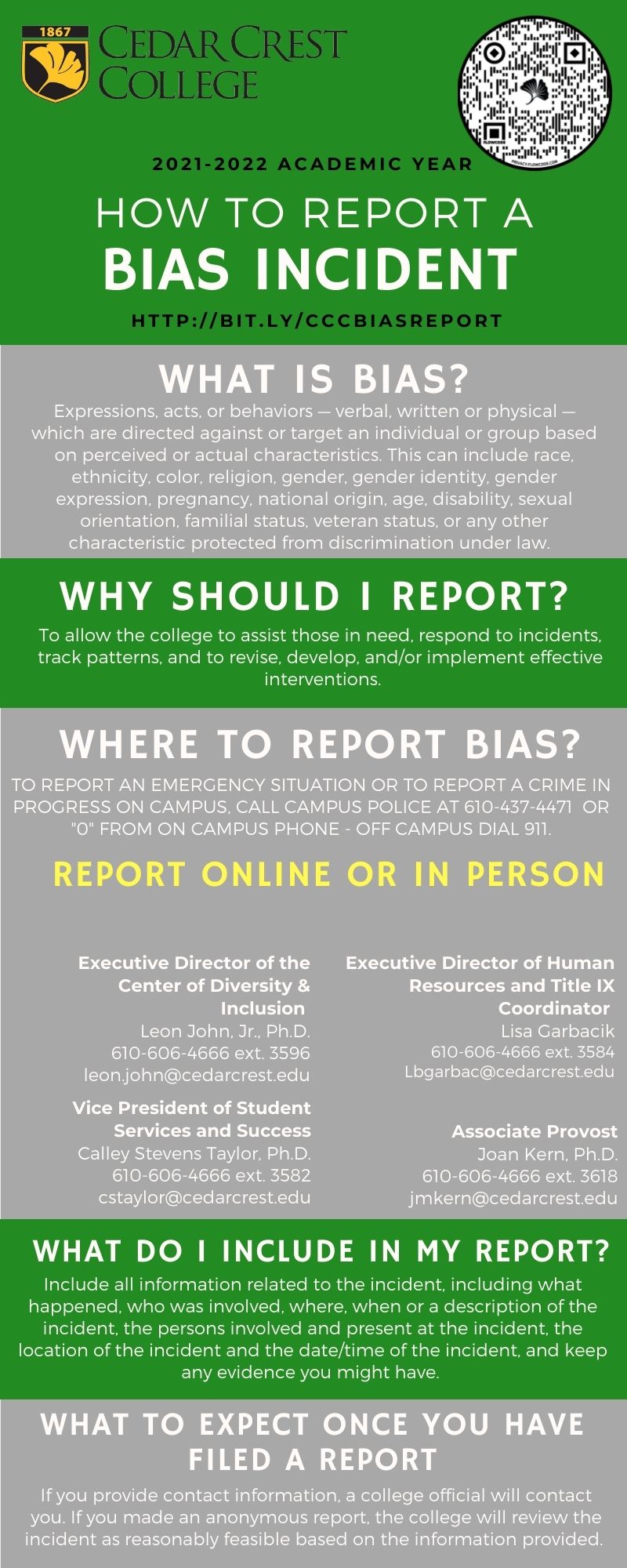Cedar Crest College (the “College”) values a diverse, inclusive, and equitable learning environment. The College is committed to maintaining a respectful and welcoming living, learning, and working environment for all students, faculty, and staff. As such, the College has established the Bias Incident Resource Team. The Resource Team is the first response from the College in coordinating responses to bias and hate incidents. The Resource Team ensures that affected individuals have access to appropriate resources, to assist the College in its response, and to facilitate a coordinated campus response to bias-related incidents and situations.
Bias incidents are expressions, acts, or behaviors — verbal, written, or physical — which are directed against or target an individual or group based on perceived or actual characteristics, such as, race, ethnicity, color, religion, gender, gender identity, gender expression, pregnancy, national origin, age, disability, sexual orientation, familial status, veteran status, or any other characteristic protected from discrimination under law. Bias incidents include hate crimes as defined under Federal and applicable state law. Incidents do not need to be hate crimes to be reported. All such incidents may violate College policies regarding student, faculty, and staff conduct, as well as laws against discrimination. The College strongly encourages the reporting of all hate crimes and bias incidents.
As an academic community, the College values protected free speech as central to the advancement of learning. The College also recognizes an obligation to ensure an educational environment that is welcoming and inclusive of all learners.
The Bias Incident Resource Team does not replace processes and policies for reporting and addressing acts of discrimination, harassment, or violence, including but not limited to those established in student, faculty, and staff handbooks or by the offices of Student Affairs, Human Resources, the Provost, or the College Police.
Retaliation of any kind against a student or member of the faculty, staff, or college community for submitting a bias incident report, participating in a bias follow-up procedure, or refusing to participate in a bias follow-up procedure is explicitly prohibited.
Reporting Bias
Why Should I Report?
Reporting bias and hate crimes allows the College to assist those in need, respond to incidents, track patterns of incidents, and to revise, develop, and/or implement effective interventions to maintain a respectful and welcoming living and learning environment for all students, faculty, and staff.
How Do I Report?
Report suspected bias or hate crime incidents to the College in the following ways:
TO REPORT AN EMERGENCY SITUATION OR TO REPORT A CRIME IN PROGRESS:
ON CAMPUS - CALL CAMPUS POLICE AT 610-437-4471 or "0" (from a campus phone)
OFF CAMPUS - CALL 911
Incidents that threaten, result in, or potentially could result in physical harm or violence should be immediately reported to law enforcement.
For all other matters, you may file a report by:
In person — Contact a Bias Incident Resource Team member (See Below)
ONLINE FORM PRESS HERE
Individuals may request that their report be anonymous. The Bias Resource Team recognizes the importance of balancing an individual’s right to confidentiality and privacy with the community’s need to know how the College is responding to an incident. All incidents reported to the Bias Resource Team will be handled with privacy and discretion. Any personal information obtained will be subject to disclosure only to the extent required by law, or as required for the College to respond appropriately.
What Do I Include in My Report?
Include all information related to the incident, including what happened, who was involved, where, when or a description of the incident, the persons involved and present at the incident, the location of the incident and the date/time of the incident.
Keep any evidence, including photographs, written notes, text messages, documents and contact information for witnesses or other persons involved with the incident. File a report as soon as possible after the incident occurs to preserve the accuracy of information.
Note: A lack of "hard evidence" or significant time lapse since an incident occurred should not discourage you from filing a bias report.
Who Can Report Bias?
Any member of the College community—students, faculty, staff, or visitors—can report incidents involving bias or hate.
What to Expect Once You Have Filed a Report
If you provide contact information, a College official will contact you. If you made an anonymous report, the College will review the incident as reasonably feasible, based on the information provided. If you are willing to meet with the Response Team, the team may review additional options and resources with you.
Bias Incident Resource Team
|
Initial Responders
They are the first line of review for all cases. Based on the nature of the situation, this team may refer cases on to other departments or convene a team of Secondary Responders. This primary team is also responsible for generating all Bias Incident Resource Team reports.
|
|
Students
|
Staff and Faculty
|
|
Executive Director of Diversity and Inclusion
Leon John, Ph.D.
610-606-4666 ext. 4555
Allen House, 2nd Floor, Office #1
leon.john@cedarcrest.edu
|
Director of Student Accessibility Services
Crystal Stubbs
610-606-4666 ext. 4462
Cressman Library Office 320
crystal.stubbs@cedarcrest.edu
|
|
VP of Student Services and Success
Calley Stevens-Taylor
610-606-4666 ext. 3582
cstaylor@cedarcrest.edu
|
Associate Provost
Joan Kern, Ph.D.
610-606-4666 ext. 3618
jmkern@cedarcrest.edu
|
|
Secondary Responders
The following individuals serve in a secondary capacity; and, assess particular incidents and situations based on their expertise with specific types of bias response and professional employment within the campus community.
|
|
Students
|
Staff/Faculty
|
|
TBD
|
Provost
Robert A. Wilson, PhD
610-606-4666 ext. 3474
Provost Office
rawilson@cedarcrest.edu
|
|
TBD
|
Academic Department Chairs
Cedar Crest Directory
|
Resources
Learn more about the definitions of bias, harassment, and discrimination

